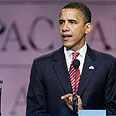
Obama addressing AIPAC
Photo: AFP
Barack Obama did the job for me.
In his appearance before AIPAC, the Democratic presidential candidate delivered an enthusiastic Zionist speech. I downloaded it from the AIPAC website, saved it on my computer and on my cell phone, and printed out many copies of it.
From now on, I will no longer have to prepare an outline for myself ahead of panel discussions with European or American leftists to which I am invited on occasion. I will no longer have to dig deep and uncover old quotes dating back to the establishment of the State of Israel that attest to the Left’s support for the Zionist idea. I will no longer need to come up with wording that will explain Israel’s policy in terms accepted by human rights groups.
From now on, I will only carry Obama’s speech with me. I’ll quote extensive sections from it, and I will even hand it out to participants in those exhausting symposiums, discussions, and debates. I’m certain that the speech will do most of the work for me; and not because Obama’s explanations and wording in favor of Israel and Zionism are so convincing, deep, and wise. They are not.
In this case, the speaker is what matters here, not the speech itself: Obama’s personality, image, and messianic status in the leftist camp will do the work for me.
Obama is the great black hope of the global Left. The enthusiasm over him – known as Obamamania – is shared by social justice groups, the “Greens,” globalization opponents, student groups in the US, France, Britain and Third World colleges, post-modernist and neo-Marxist intellectuals, and a wide and diverse array of non-governmental organizations.
Most of these organizations are harsh critics of Israeli government policies, support the Palestinians, reject Zionism to some extent at least as a camouflaged metamorphosis of colonialism, and even question the right to exist of the Jewish State, which in their view is premised on injustice, occupation, and apartheid.
This is the coalition that controlled the first human rights conference in Durban, South Africa, and enforced on it the most rabid anti-Israel and anti-Zionist decisions.
Shallow, simplistic, and one-sided
Yet there comes Barack Hussein Obama, their idol, the dark-skinned man who makes them melt in his presence and addicted to his speeches, and publicly declares, live on all television networks: Israel is a wonderful country; it has quality, values, and it is law-abiding. For me, Zionism is a highly justified national movement. Israel’s security is holy. The Arabs must recognize Israel as a Jewish state and Jerusalem as its capital. I have nothing bad to say about the separation wall built by Israel vis-à-vis the Palestinian Authority. And thank you for voting Obama.If it was another US presidential candidate, the words would be seen as a form of sycophancy to the Jewish vote, proof of the immense power of the pro-Israel lobby, and yet another particularly blatant expression of American politics’ subjugation to Israeli interests.
However, all these accusations cannot be leveled at Obama. After all, he is the admired leader, the leading model of the “other politics”: Clean, transparent, moral, one that does not capitulate in the face of pressure groups and big money.
After all, Obama was elected as the Democratic Party’s presidential candidate (even though “elected” is a little exaggerated: Overall, Obama received fewer primaries votes than Hillary Clinton did, and lost to her in all the large states) because he dared say everything he believed in, without holding back. Therefore, the sincerity of his love for Zionism and Israel, as it was powerfully expressed in his AIPAC Conference speech, cannot be doubted without doubting the man himself and his entire path to the presidency. And this shall not be done.
Obama’s speech was shallow, simplistic, one-sided, made up of sections that do not come together to form a well-reasoned sequence, replete with slogans, clichés, and exclamation marks – and still, there is none that can match its significance and contribution to the State of Israel at this time. It was a very banal speech, and a very historic one too.















